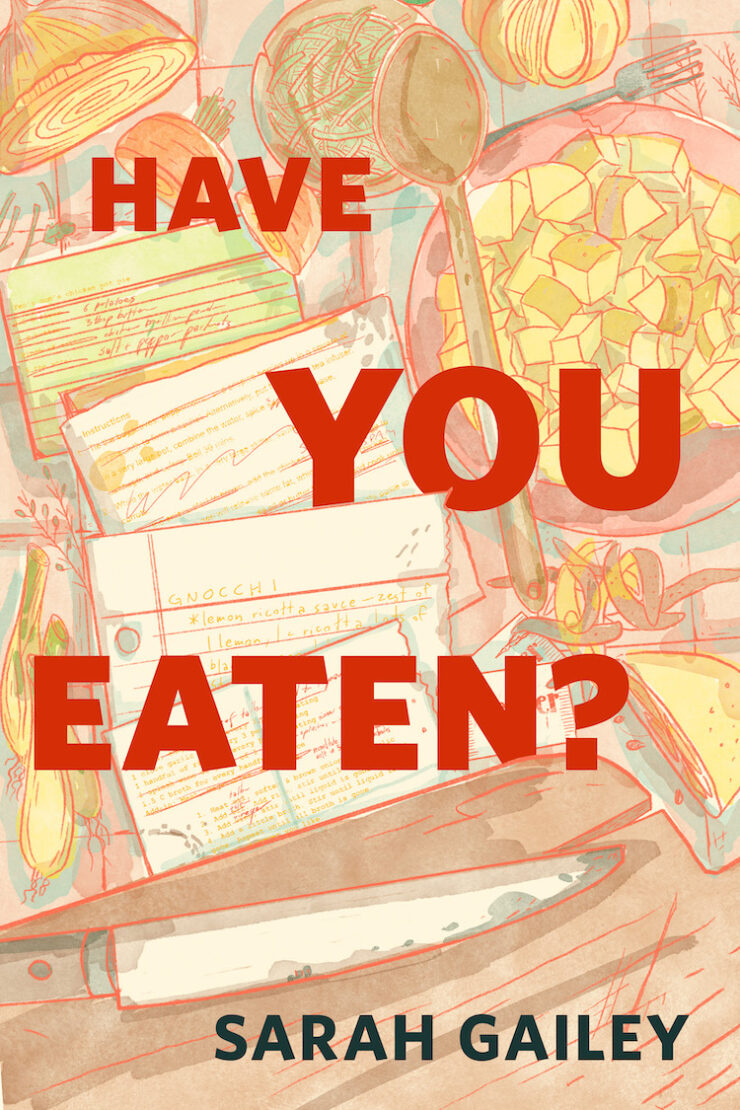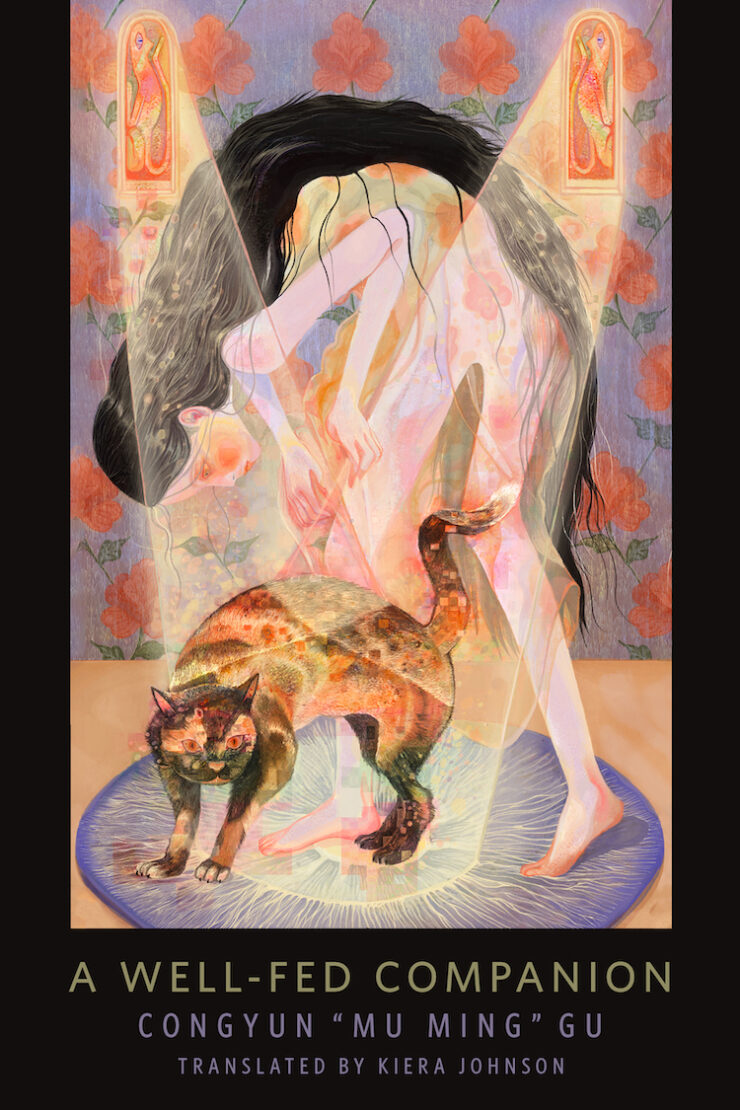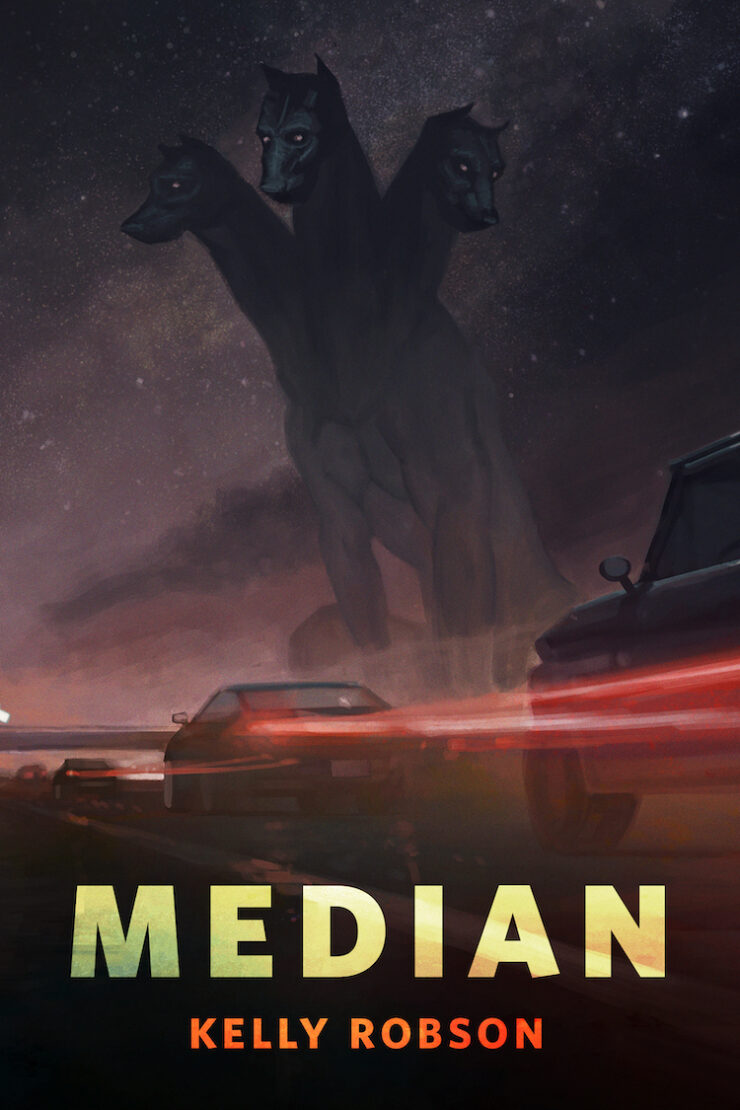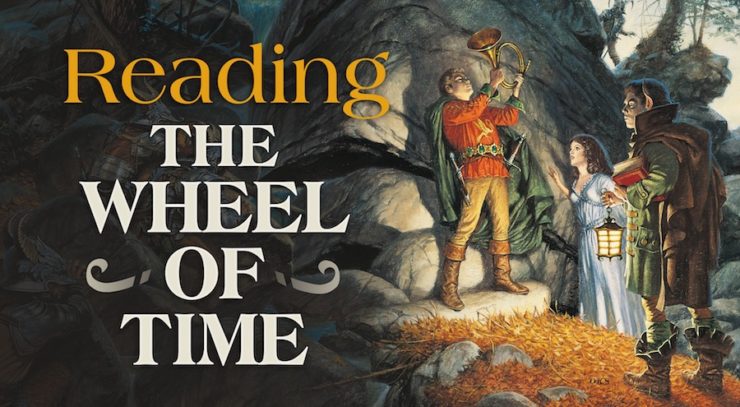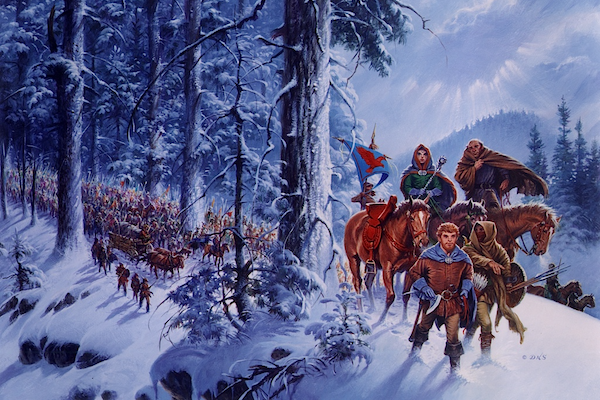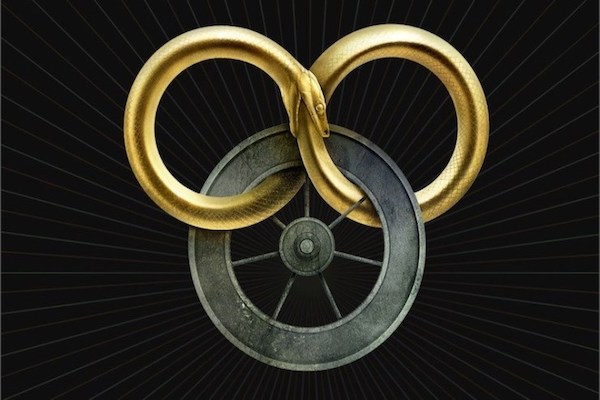Welcome back to Reading The Great Hunt! This week Rand and Egwene both find themselves in a new society with new rules, and both of them are preparing to learn some possibly uncomfortable lessons. But there’s good news too, in the formation of new friendships and the return of old ones, and also a little bit of gratuitous shirtless boys.
Chapter 24 opens with Egwene following an Accepted named Pedra through the halls of the White tower. She observes the other woman’s dress, white like the one Egwene has been given, but with colored stripes along the hem, and thinks of Nynaeve, who has also been given an Accepted’s dress and the golden ring of the serpent eating its own tail, but who now seems to Egwene to be haunted by the trial that gained her that status.
Buy the Book
The Great Hunt
Pedra shows Egwene to her room, curtly explaining that she is being given some free time on her first day, and that she is expected to be in the scullery “when the gong sounds High, and not one moment later.” Egwene gives her a respectful curtsy but then sticks her tongue out behind Pedra’s back; she has already developed a dislike for the woman.
In her room, which is quite sparse, Egwene meets Elyane, who immediately strikes her as poised and elegant. Elayne surprises her by knowing Egwene’s name and where she’s from. She explains to Egwene that someone who has been in the Tower for a while is always assigned to a new novice to help her learn her way around. She explains how Egwene’s schedule will work, the time spent training and the time spent doing chores.
Elayne’s blue eyes took on a thoughtful expression. “You were born with it, weren’t you?” Egwene nodded. “Yes, I thought I felt it. So was I, born with it. Do not be disappointed if you did not know. You will learn to feel the ability in other women. I had the advantage of growing up around an Aes Sedai.”
Egwene is curious about how Elayne could have grown up around Aes Sedai, but the other woman continues, explaining that Egwene shouldn’t be frustrated if she can’t do much with the One Power right away, or even for a while. In time, however, she will learn to sense the ability in other women and to see when they are channeling. Egwene answers that she has had a little training already, and summons a sphere of light above her hand. Elayne responds by doing the same, and Egwene is startled to see a faint light glowing around the other woman. She gasps and drops her hand, but not before Elayne has a chance to see the same glow around Egwene. The two bond over the fact that this is the first time either of them has been able to see the channeling, and agree that they are both going to be good friends.
Then, Elayne asks if Egwene knows Rand, and Egwene suddenly remembers the story Rand told of meeting the Daughter-Heir of Andor and realizes who Elayne is. Elayne confirms it, but adds that if Sheriam knew she’d mention it, she’d definitely be called into her study. Egwene asks why everyone talks about such an event like it’s such a very big deal, and Elayne tells her that Sheriam keeps a willow switch on her desk, and that there are so many rules for novices that it is very hard to never break any. Egwene is horrified, insisting that they are not children and should not be treated as such.
“But we are children. [Elayne answers] The Aes Sedai, the full sisters, are the grown women. The Accepted are the young women, old enough to be trusted without someone looking over their shoulders every moment. And novices are the children, to be protected and cared for, guided in the way they should go, and punished when they do what they should not. That is the way Sheriam Sedai explains it. No one is going to punish you over your lessons, not unless you try something you’ve been told not to. It is hard not to try, sometimes; you will find you want to channel as much as you want to breathe. But if you break too many dishes because you are daydreaming when you should be washing, if you’re disrespectful to an Accepted, or leave the Tower without permission, or speak to an Aes Sedai before she speaks to you, or…. The only thing to do is the best you can. There isn’t anything else to do.”
Egwene is shocked, but Elayne explains that even though there are not enough Aes Sedai, even though there are at this moment only 40 novices in the Tower, the Aes Sedai cannot lower their standards, cannot accept women to full sisterhood who cannot channel well enough, or who will allow themselves to be intimidated, or who will give up when things get difficult. Egwene remembers being told some of this, but she never thought about there not being enough Aes Sedai. Elayne explains that Sheriam has a theory that, because of three thousand years of Red Ajah hunting down men who could channel, the Aes Sedai have been culling the ability to channel out of humankind.
Elayne then asks after Rand, annoying Egwene but also scaring her a little; after deciding that there is no way that Elayne could know about Rand’s ability to channel, she answers that she last saw him riding with the Shienarans. Elayne admits that she finds herself thinking of Rand in odd moments, and mentions Elaida’s interest in him. Hearing that a Red is interested in Rand puts Egwene on edge again, and she hurries to insist that she doesn’t know where Rand is now, but Elayne assures her that she has no intention of telling Elaida where Rand is. Besides, Elayne hasn’t seen her since the day they arrived.
She decides that she wants to take Egwene to meet two other girls who also know Rand. Egwene observes that Rand knows a lot of girls, and Elyane seems confused by the comment, but continues to explain that one is a girl named Else Grinwell who met Rand and Mat when they stayed at her father’s farm, and they inspired her to want to run away and be an Aes Sedai. Egwene huffs, annoyed, but further discussion is cut off by the sudden appearance of a man, tall and dark haired, who looks very sad and stands staring at them until an Accepted appears and tells him that he is not supposed to be there. She directs him back to the garden, the man complaining, sorrowfully and yet idly, that they are always watching him, and that they are probably just afraid he will find a knife to turn on himself. The Accepted leads him away.
“Logain,” Elayne said when he was gone.
“The false Dragon!”
“He has been gentled, Egwene. He is no more dangerous than any other man, now. But I remember seeing him before, when it took six Aes Sedai to keep him from wielding the Power and destroying us all.” She shivered.
Thinking of Rand, Egwene asks if men with the Power must always be gentled, explaining that she would have thought the Aes Sedai would look for another way, since the greatest feats of the Aes Sedai required male and female channelers. Elayne responds that they did try, for three hundred years, before they realized there was no other way to find.
They continue on to a different garden then the one Logain is in, where they meet Min, who Egwene recognizes from Baerlon. Min recognizes her too, but assures her she holds no ill will after what happened, given how much gold was sent to Master Fitch. She and Elayne tease each other a little, and then Min asks how Rand is, sparking more annoyance in Egwene. She responds curtly, asking Min what she is doing in Tar Valon since she is clearly not meant to be an Aes Sedai. Elayne explains to Min that Egwene likes Rand.
“I know.” Min glanced at Egwene, and for an instant Egwene thought she saw sadness—or regret?—in her eyes. “I am here,” Min said carefully, “because I was sent for, and was given the choice between riding and coming tied in a sack.”
“You always exaggerate it,” Elayne said. “Sheriam Sedai saw the letter, and she says it was a request. Min sees things, Egwene. That’s why she’s here; so the Aes Sedai can study how she does it. It isn’t the Power.”
Min points out that a request from an Aes Sedai is like being commanded by a Queen with an army, and, when Egwene is confused, they explain the auras that Min sees around people. Min claims that she does not usually know what the things she sees mean, although she did see the crown of Andor and knows that Elyane was the future Queen. When Egwene asks what Min sees when she looks at her, Min mentions a white flame, among other things she doesn’t understand.
Just then, two shirtless young men pass by, looking sweaty and carrying sheathed swords. Egwene is immediately struck by the handsomeness of one of them, so much so that she hardly registers the introduction of Galad and Gawyn. Galad immediately bows over her hand.
“If your duties allow,” Galad said, “I would like to see you again, Egwene. We could walk, or if you obtain permission to leave the Tower, we could picnic outside the city.”
“That—that would be nice.” She was uncomfortably aware of the oth- ers, Min and Gawyn still with their amused grins, Elayne still with her scowl. She tried to settle herself, to think of Rand. He’s so . . . beautiful. She gave a jump, half afraid she had spoken aloud.
“Until then.” Finally taking his eyes from hers, Galad bowed to Elayne. “Sister.” Lithe as a blade, he strolled on across the bridge.
“That one,” Min murmured, peering after him, “will always do what is right. No matter who it hurts.”
“Sister?” Egwene said. Elayne’s scowl had lessened only slightly. “I thought he was your… I mean, the way you’re frowning…” She had thought Elayne was jealous, and she still was not sure.
“I am not his sister,” Elayne said firmly. “I refuse to be.”
“Our father was his father,” Gawyn said dryly. “You cannot deny that, unless you want to call Mother a liar, and that, I think, would take more nerve than we have between us.”
For the first time Egwene realized that he had the same reddish gold hair as Elayne, though darkened and curled by sweat.
“Min is right,” Elayne said. “Galad has not the smallest part of humanity in him. He takes right above mercy, or pity, or… He is no more human than a Trolloc.”
Gawyn jokes about Galad’s interest in Egwene and the two argue a little about the value of swordplay, before Elyane mentions to Gawyn that Egwene knows Rand.
“Of course,” Gawyn said slowly. “Such a strange fellow. A shepherd, he said, though he never looked or acted like any shepherd I ever saw. Strange. I have met all sorts of people, and they’ve met Rand al’Thor. Some do not even know his name, but the description could not be anyone else, and he’s shifted every one of their lives. There was an old farmer who came to Caemlyn just to see Logain, when Logain was brought through on his way here; yet the farmer stayed to stand for Mother when the riots started. Because of a young man off to see the world, who made him think there was more to life than his farm. Rand al’Thor. You could almost think he was ta’veren. Elaida is certainly interested in him. I wonder if meeting him will shift our lives in the Pattern?”
Egwene is struck by Gawyn’s musings, about how she never really thought much about Rand’s ta’veren nature because he was always just Rand to her. But she thinks of how ta’veren really did move people, whether they wanted to be moved or not, and suddenly feels the urge to tell the other girls how much she likes them and how she wants to be their friend. They end up in a group hug, confusing Gawyn, who only gets giggling in response.
“We three are tied together,” Min [says], “and we cannot let any man get in the way of that. Not even him.”
Gawyn tells them not to mention Rand to Elaida, as she has been quite intent about finding out more about Rand, and as if his words summoned her, he catches sight of Elaida and quickly leaves, not wanting to get a lecture for having his shirt off. Elaida approaches them, and something about her strikes Egwene as hard. Elida is greated by Elayne, who introduces Egwene. But Elaida upbraids her for speaking so familiarly, reminding Elayne that she is not the Daughter-Heir here, but a novice. A gong strikes and Elaida sends them off to their chores, instructing Elayne to see the Mistress of Novices in her study after, for speaking to an Aes Sedai before being spoken to.
As they run off, quietly vowing to each other that they will be Aes Sedai one day, Egwene hears Elaida speak to Min, asking about why Moiraine summoned her.
When Min is finally able to get away from Elaida’s questioning, she is coated in sweat and anxious to make sure the Aes Sedai isn’t following her. She had been surprised that Elaida knew Moiraine had summoned her; that was supposed to be a secret only Moiraine and Sheriam knew. And Elaida had asked so many questions about Rand. Min managed not to give anything away as she lied and said that she had never heard of him, and she thinks privately that she does not want to fall in love with a farmboy she’s only met once. She hopes Moiraine will come soon, to tell her what she wants of Min so that Min can leave.
Meanwhile Rand is doing his best not to chafe under his “escort” of Cairhienin soldiers. Approaching the walls of the city, they pass through the Foregate, a bustling community that grew up from markets that existed at each gate in the city walls. Despite the tangle of the crowds and the general shabbiness of the place, Rand finds that he rather likes the bustling community, full of vendors calling their wares, people in brightly colored clothes, and even street performers. Tavolin is dismissive of the peasants, and Hurin explains to Rand that the community is comprised of the families of farmers who were displaced during the Aiel War. Too afraid to return to their lands near the Spine of the World, the people all stayed and now live in the Foregate. As a result, the King has to have barges of grain from Andor and Tear, since there are no more farms in the east. But Hurin cautions Rand not to speak of it in front of the Cairhienin; they like to pretend that the Aiel War never happened, or at least that they won it.
Seeing a procession of huge puppets in the street, which include fanciful creatures and what appears to be meant to be a Trolloc (Hurin observes that clearly none of these people has ever seen a Trolloc) Rand asks if there is some kind of festival. Loial explains that Galldrian keeps the people quiet by paying for entertainers to be always in the Foregate, including Illuminators who set off fireworks many nights. Rand has never heard of Illuminators leaving their home in Tanchico to put on displays for anyone but a ruler, and is perplexed by this city. They come to a guardhouse, where they are instructed to wait while Tavolin goes inside. As they sit on their horses and wait, Rand takes the opportunity to look over the city. In contrast to the Forgate, the architecture and people of Cairhien are sparse, dark, and stoic. He can also see tall towers with workmen surrounding them.
“The Topless Towers of Cairhien,” Loial murmured sadly. “Well, they were tall enough to warrant the name, once. When the Aiel took Cairhien, about the time you were born, the towers burned, and cracked, and fell. I don’t see any Ogier among the stonemasons. No Ogier could like working here—the Cairhienin want what they want, without embellishment—but there were Ogier when I was here before.”
Tavolin returns from the guardhouse with another officer and two clerks. He makes introductions, referring to them as “Lord Rand of House al’Thor, in Andor, and his man, called Hurin, with Loial, an Ogier of Stedding Shangtai.” A clerk holds open a large ledger book and the officer, Asan Sandair, writes their names down and instructs Rand that he must return the next day and inform them which inn he is staying in. Rand asks about inns in the Foregate, shocking everyone, and at a hastily whispered admonishment from Hurin, assures the Cairhienin that they will find somewhere in the city. Rand also asks if they are familiar with Selene, and Sandair promises to make inquiries and share what he learns with Rand when he returns to the guardhouse.
Despite the fact that even Loial doesn’t draw much attention, Rand feels like people are looking at him as they make their way through the streets. Hurin, who has been in the city a few times before, leads them to an inn called The Defender of the Dragonwall. A hostler takes their horses, and the other guests in the common room don’t seem to take any notice of them, bur Rand still feels like everyone is sneaking glances when he isn’t looking. The innkeeper gives them an odd look as he takes in Loial with the blanket-covered chest, Hurin with their bags, and Rand in his coat with the heron-marked blade at his side, and Rand realizes as they are greeted that the man took him, for a moment, to be Aiel. He itches to be out of the place, but knows that it is the most likely place to rendezvous with Ingtar, and of course there is also Selene, out there somewhere waiting for them.
They get two rooms that connect, since Rand, despite his protests, needs to at least somewhat appear like a lord, and once they are alone he declares his intention to go back to the Foregate, at least for a little while, because he can’t stand the way it feels like everyone in the city is always looking at you. He asks which one of them is willing to take first watch over the chest, and Loial volunteers, saying that he wants to catch up on some reading. When pressed, however, he admits that he is wary of running into any other Ogier who might wonder what Loial is doing out on his own, and Rand is reminded that Loial essentially ran away from home to see the world. Rand invites Hurin to come with him instead, but Hurin also would rather stay—there are too many brawls and such in the Foregate and it stinks to him—and asks Rand’s permission to have a drink in the common room instead. Rand reminds Hurin that he doesn’t need Rand’s permission for anything, to which Hurin responds “As you say, my Lord,” and gives a bit of a bow.
They head down to the common room, where Cuale, the innkeeper, surprises Rand with a tray bearing three folded and sealed parchments; invitations from three Houses.
Who would send me invitations?” Rand turned them over in his hand. None of the men at the tables looked up, but he had the feeling they were watching just the same. He did not recognize the seals. None was the crescent moon and stars Selene had used. “Who would know I was here?”
“Everyone by now, Lord Rand,” Hurin said quietly. He seemed to feel eyes watching, too. “The guards at the gate would not keep their mouths closed about an outland lord coming to Cairhien. The hostler, the innkeeper… everybody tells what they know where they think it will do them the most good, my Lord.”
With a grimace, Rand took two steps and hurled the invitations into the fire. They caught immediately. “I am not playing Daes Dae’mar,” he said, loudly enough for everyone to hear. Not even Cuale looked at him. “I’ve nothing to do with your Great Game. I am just here to wait for some friends.”
Hurin is horrified, and begs Rand not to do such a thing again, surprising Rand with the suggestion that he will receive more invitations. Hurin assures Rand that he will, that every lord and lady in Cairhien plays it, and by denying that he is playing it at all, Rand has probably convinced everyone that he is very deep in the game. Furthermore, he has now made enemies of three noble Houses, though they are probably not great ones, since they moved so quickly. Hurin urges Rand to answer all other invitations, to decline if he wants, and begins to go into details about what people will read into his responses, but Rand cuts him off to reiterated that he will have no part in the game and that they are there to wait for Selene. He tells Hurin to have his drink.
He stalked out angrily, not sure whether he was angry with himself, or with Cairhien and its Great Game, or Selene for vanishing, or Moiraine. She had started it all, stealing his coats and giving him a lord’s clothes instead. Even now that he called himself free of them, an Aes Sedai still managed to interfere in his life, and without even being there.
A guard takes note of Rand passing out into the Foregate but Rand ignores him, following the sound of music and laughter, and Rand finds that, while his coat is in much better shape than those of the Foregaters, he still doesn’t stand out as much, now that he is surrounded by people in just as many bright colors as he is. He watches another procession go by, and Rand watches a Trolloc puppet be easily defeated by the puppet of a crowned man.
Rand begins peering into the doorways of the large, windowless buildings that line the streets. Inside he discovers performers, jugglers, and gleemen who remind him of his old friend, Thom Merrilin. Hurrying on, he discovers a woman in a white dress performing tricks, and the man at the door tells him it costs two coppers to “see the Aes Sedai.” Rand hurries away again, and makes his way through the crowd. He’s unsure about where to go next when suddenly he hears a voice, a deep sonorous voice accompanied by the plucking of a harp.
The voice drew Rand like a rope. He pushed through the doorway as applause rose within.
“Two coppers, my good Lord,” said a rat-faced man who could have been twin to the other. “Two coppers to see—”
Rand dug out some coins and thrust them at the man. He walked on in a daze, staring at the man bowing on the dais to the clapping of his listeners, cradling his harp in one arm and with the other spreading his patch-covered cloak as if to trap all the sound they made. He was a tall man, lanky and not young, with long mustaches as white as the hair on his head. And when he straightened and saw Rand, the eyes that widened were sharp and blue.
“Thom.” Rand’s whisper was lost in the noise of the crowd.
Holding Rand’s eye, Thom Merrilin nodded slightly toward a small door beside the dais. Then he was bowing again, smiling and basking in the applause.
Rand goes where he is directed, waiting in the wings of the stage with other performers limbering up around him, until he is joined by Thom, who, other than moving with a bit of a limp, seems much like his old self, eyeing a juggler disdainfully and complaining that the audience only ever wants to hear The Great Hunt of the Horn. He gives Rand a once over and declares that he looks like he is doing well.
Rand, overjoyed, tells Thom that he was sure that he was dead, even though Moiraine said that he was still alive, and apologizes for not going back to help him. Thom replies that Rand would have been a fool to do so; the Fade had no interest in him and left him quickly—after giving him the present of a stiff leg—to pursue Rand and Mat. He asks after Moiraine, and seems even a little disappointed that she isn’t with Rand.
“Too bad, in a way. She’s a fine woman, even if she is….” He left it unsaid. “So it was Mat or Perrin she was after. I won’t ask which. They were good boys, and I don’t want to know.” Rand shifted uneasily, and gave a start when Thom fixed him with a bony finger. “What I do want to know is, do you still have my harp and flute? I want them back, boy. What I have now are not fit for a pig to play.”
Rand assures Thom that he still has his belongings, and promises to bring them to him. The make arrangements to meet at The Bunch of Grapes, where Thom is staying, and he returns to the stage to give the audience one more tale.
Rand is not the only person who is happy to see Thom again. As you all know, I was convinced from the get-go that until we saw a body he was definitely not dead, especially once Moiraine had the same opinion. But what I really want to know is more of his backstory with the Queen of Andor, and more about his nephew while we’re at it. I am also guessing that there is a bit more to the story of Thom surviving the Fade than “it stabbed me in the leg and then left.”
Buy the Book
The Ruin of Kings
Back in The Eye of the World, the initial group of travelers shared a lot of similarities to the Fellowship in The Lord of the Rings, and one thing that I found interesting about it is that while the role of Gandalf mostly went to Moiraine, there were aspects of that role that were filled by Thom, especially once he and Rand and Mat were separated from the others. He even has the white hair and mustache, and he has the playfulness and surprises of Gandalf the Grey, while Moiraine has the power, seriousness, and otherworldliness of Gandalf the White. Of course, there is also an aspect of Boromir to Thom; he is the other warrior to Lan’s Aragorn, and his “death” is an atonement for a past failure to protect someone like Rand and Mat.
In any case, Fate/The Pattern/Rand’s ta’veren-ness seems to know exactly what Rand needs in this moment of his journey. Since Thom was a bard in a royal court and has extensive knowledge of the world, he’s a perfect person to give Rand some advice and guidance while he is in Cairhien and dealing with all the political machinations of the Great Houses and Daes Dae’mar. Rand might be able to get some helpful information about the Horn from Thom as well. I do wonder if Rand trusts Thom enough to tell him outright about the Horn; he is the person Rand confided in about his dreams, after all, and Rand is definitely the sort of person to put his faith in someone who was literally willing to die to protect him. On the other hand, Rand is also accomplished at hiding things from his friends to protect them. And to protect himself.
But Rand isn’t the only one dealing with political machinations, and Egwene is also going to have to learn her way around some tricky games too— they’ll just be the Game of Ajah instead of the Game of Houses. Elayne is probably going to be a useful friend in that regard, since Egwene has a bit of that sweet, naive farmgirl thing going for her right now. She’s smart though, and I have a feeling that she’ll figure out how to adapt pretty quickly.
I was terribly confused by Elayne’s question “You were born with it, weren’t you?” She already knows that Egwene is the new novice Elayne is supposed to show around, so she can’t just be asking if Egwene has the ability to channel. We’ve heard Aes Sedai use the phrase “born with the spark” before, but there has never been any indication that one can become a channeler in any other way besides being born with the ability, so the what the heck does that question mean?
Also I loved how Egwene was trying to sound modest when she admitted to having had some training already, and then immediately performed the biggest move she knew how to do. Not surprising since she’s been jumping headfirst into channeling since day one, and I have to say that I find Egwene’s ambition refreshing, since it really is about learning the ability for the ability’s sake. With half the characters involved in schemes upon schemes and the other half terrified of their abilities and destinies, Egwene’s motivations are—for the moment—delightfully uncomplicated.
It is interesting to see Rand and Egwene both encountering strange new cultures with rules they don’t understand, and while Rand is still being forced to play the part of a lord when he does not want to, Egwene is in the opposite position of belonging, at least for the moment, on the bottom rung of a social hierarchy. Of course Egwene wasn’t a princess like Elayne, so the adjustment won’t be quite so jarring, but Egwene has plenty of her own pride and may find it difficult being treated like a child again, expected to follow orders without question, to be seen and not heard, and perhaps even be switched for breaking rules she didn’t even know about.
I sense some trouble in the Aes Sedai ranks in that regard. Of course, their need for the kind of break-them-down training that ensures that only the strongest-willed and most powerful channelers make Aes Sedai is clear. In a war against the Dark, I don’t think anyone can really argue that there is a paramount need to ensure that those fighting it are strong enough not to waver in a crucial moment; the whole world could be at stake, after all. But it’s also hard to deny the limitations and liabilities of such training; one doesn’t have to have Nynaeve’s level of stubbornness and self-protective anger to develop some pretty destructive feelings about your fellow Aes Sedai and your place in the world under such treatment.
When, at the end of the chapter, Elayne and Egwene promised each other that they will become Aes Sedai, it didn’t strike me as a brave declaration of not letting opposition prevent them from reaching their goal. Rather, it felt like a hope for revenge, perhaps not literally but certainly in a broader sense; they are already wishing for the kind of power that will make them the ones sending people to Sheriam’s office, rather than the ones being sent. I wonder how many Aes Sedai hold secret resentments against older Sisters who are now ostensibly their equals but who they were once not allowed to speak to before being addressed themselves? How many of the Red Ajah chose that shawl not because they felt a call to protect the world from insane male channelers but because it gave them a feeling of power over others who they could consider and treat as lesser than themselves? How many other Aes Sedai make decisions that are motivated by an unhealthy attempt to engage with feelings of anger, degradation, or resentment that were born when they were a novice or an Accepted and were never dealt with? I kind of doubt the Aes Sedai have psychologists on hand.
And even if an Aes Sedai is able to rationalize and understand the way she was treated—and they do seem to all understand the need, given that Elayne is already able to articulate its importance—will she ever be able to place her full trust in an older sister who may have delivered harsh punishment in the past, or refused to speak to her, or informed on her to Sheriam? Or will she always carry that bit of doubt, a sense of needing to protect herself, and maybe a few close friends, over all others? Even with the limited amount that the reader knows of the Aes Sedai so far, we have seen how strained the relationships between Ajah are, and I wouldn’t be at all surprised if those fractures continue to show and cause problems moving forward in the story.
I was really interested watching Egwene engage with her own jealousy over Rand, and her self-awareness in realizing that these other women’s interest in him might have more to do with his effect on people as ta’veren than some kind of flirtatious or romantic connection. And I was proud of Jordan too; often male writers can fall prey to the stereotyping of young women as catty and more interested in fighting over men than in their own friendships. Instead Min and Elayne recognized Egwene’s feelings about Rand without judgement, and recognized that they’d rather be friends than worry about Rand at all. They see their importance to each other outside of their shared connection to Rand.
Of course, Min doesn’t really have anything to worry about, does she? Since she can see parts of the future and all.
Min’s observation about the fact that Galad will “always do what is right” was another confusing moment to me, probably because the word “right” doesn’t have a very clear meaning. My assumption is that she means what is “lawful” more than “morally correct” given Elyane’s tirade about Galad’s lack of mercy or pity. The interpretation of moral right can vary wildly from person to person, even in a world with a very clear Dark side and Light side, but if the Pattern itself has a sense of what is “right” for the cosmic good, as it were, perhaps that is what Min is seeing. Maybe Galad has a strong purpose within the Pattern that will only become clear to us later. And as I recall, Gawyn also said the same thing of Galad after he found Rand in the garden; “Galad always does the right thing… even when he should not.”
Also, dear readers, can I just say? Elayne, Elaida, Egwene, Gawyn, Galad; that is a lot of the same letters in a lot of different names in one chapter.
I suppose I should have expected to see Logain again, since the moment when Rand witnessed him being taken into the palace in Andor was such a significant one. I think I just assumed that he’d be executed after he was gentled, but I suppose that the Aes Sedai could have use for his knowledge and experience even after he couldn’t channel anymore. The fact that he’s here now and wandering into our heroine’s path probably signals some significance to future events, so I guess I’ll keep my eye out for more of him now.
As far as Cairhien goes, I’ll be glad when Rand is out of there, and not just because I hate typing out the world. That place is creepy. I’m getting vibes of Ba Sing Se from Avatar the Last Airbender, and I’m half afraid if Rand doesn’t start at least pretending to play Daes Dae’mar that someone’s going to kidnap him and brainwash him in a secret facility below a giant lake. One would think that, at this point in his travels, Rand would know that he should at least try to blend in; not that I don’t understand his frustration. He’s gone from being told he’s the Dragon (which he cannot yet accept) to being called a lord and treated like nobility (which he does not see himself as) to being accused of having a lot of secrets and agendas (which he has, they’re just very different than the ones people think he has). It’s got to be very stressful. But I still laughed aloud when Hurin compared him to a man who doesn’t like hornets so he kicked the nest. It is a very apt description of Rand, and I hope for his sake that cooler heads prevail as long as they are in Cairhien.
Next week we get more drama and more danger, and some new information from Thom that even Moiraine doesn’t have. Also, Thom has a girlfriend. But in the meantime, what do you think of Rand’s inability to keep his temper in the common room? Has he just reached the end of his rope? Or, perhaps, does he not take the danger of a place like Cairhien as seriously as he takes the danger of a mirror world or the Shadowspawn? Because I have to tell you, Rand. Pretty sure that is a big mistake.
Sylas K Barrett isn’t really a D&D guy, but if he was he would want to play a character like Thomdril Merrilin.



